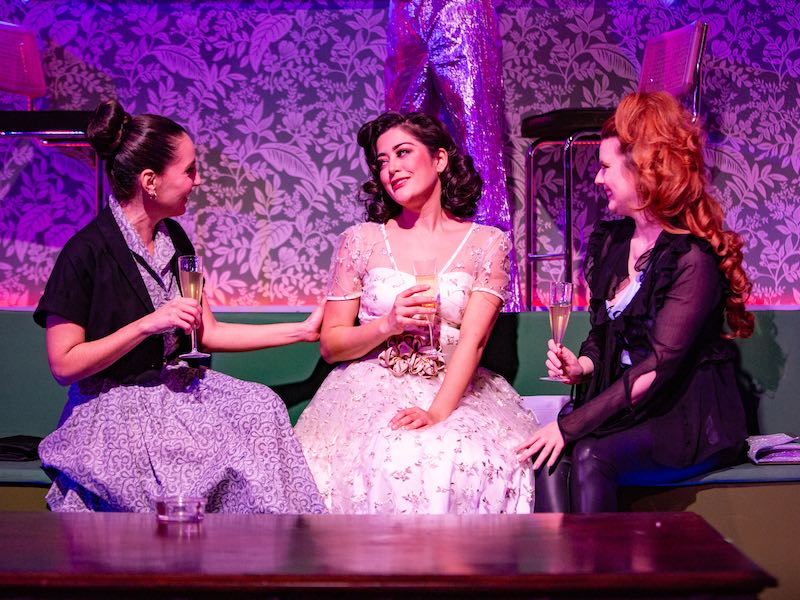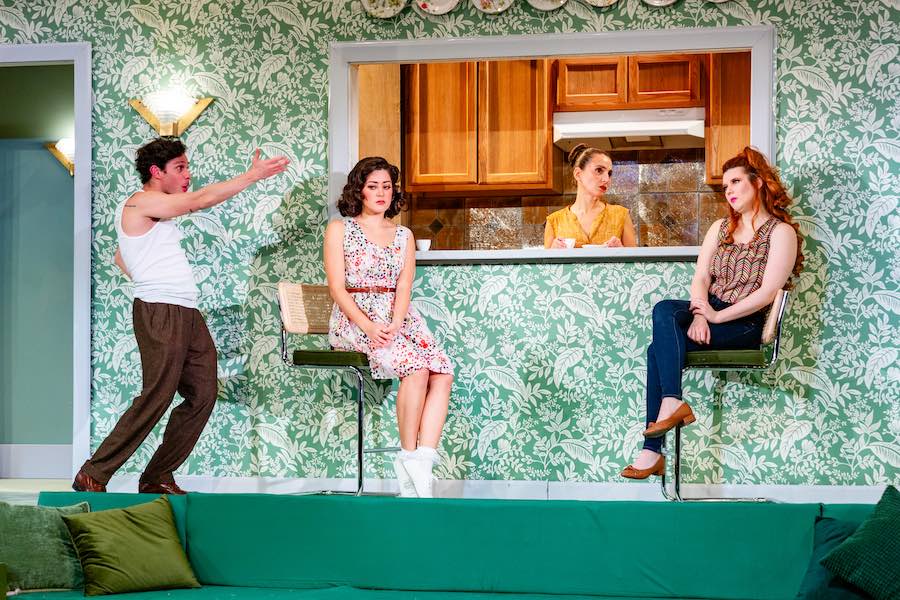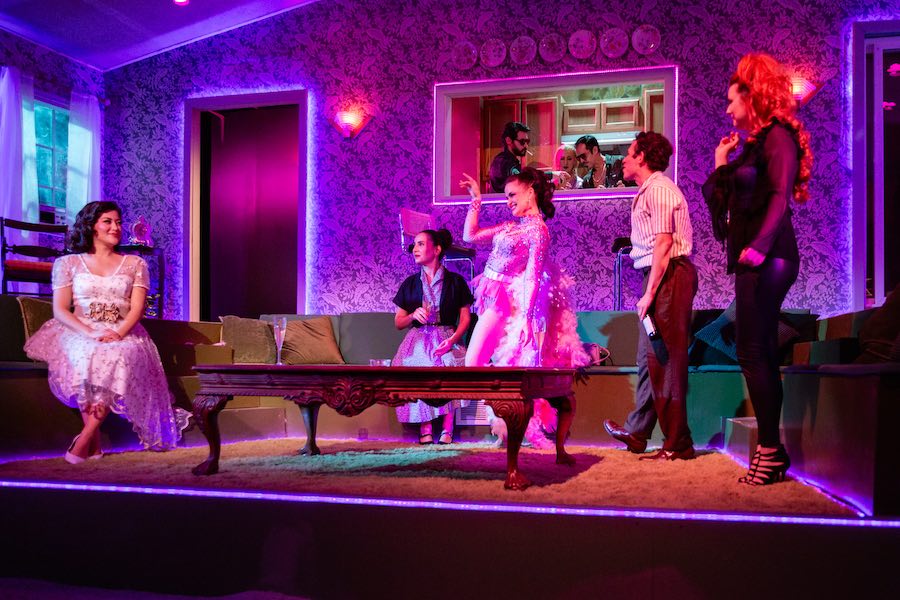Anton Chekhov once said that “what happens onstage should be just as complicated and just as simple as things are in real life. People are sitting at a table having dinner, that’s all, but at the same time their happiness is being created, or their lives are being torn apart.” In GALA Hispanic Theatre’s world premiere of Las Hermanas Palacios (The Palacios Sisters), this triumphant adaptation of Chekhov’s Three Sisters does just that.
Las Hermanas Palacios captures both the complications and simplicity of life with a specificity in its writing and design so chillingly precise that I had trouble believing I was in a theater in Columbia Heights and not actually in 1985 Miami. The play follows Olga, María, and Irinita Palacios as they navigate their new lives in exile, away from their beloved Havana.

As the play begins, we are catapulted through time and space to La Varona’s nightclub to celebrate the 21st birthday of Irinita, the baby of the Palacios siblings. At La Varona’s, the lights hum in neon, transforming the set from the Palacios’ modest green home into a pulsating club. Gloria Estefan rings in our ears as the company enters and the owner of the nightclub, La Varona (Luz Nicolás), hypes up the audience as if we were club patrons. Nancy (Rachael Small), the suffocatingly pink Midwestern showgirl, dances as Palacios brother Andrés (Víctor Salinas) plays the trumpet.
Newly arrived from Cuba, Irinita (Carolina Reyes) is already desperate to return to Havana, the Palacios’ own version of Chekhov’s Moscow — the unrealistic projection of all their hopes and dreams. All four siblings find themselves wanting: Irinita longs to dance at the National Ballet of Cuba, while her older sister María (Catherine Nuñez) wishes for a child despite the abuses of her policeman husband. Their brother hopes to play his more serious repertoire as a pianist as Olga (Yaiza Figueroa) is the fiercely protective and pragmatic eldest sister who wants to keep the family together, especially as the violence and unrest of Miami threatens to destroy them all. She also hopes to push Nancy, her brother’s pregnant girlfriend, from their lives as she threatens to wedge herself into their family, both financially and physically.
As I write this review, it strikes me that these problems seem rather mundane — and they certainly feel that way in many productions of Three Sisters. It’s a naturalistic work, certainly, but Las Hermanas Palacios elevates the original text for audiences in the United States and the Americas by making Havana the city on which many of the characters pin their hopes. Chumo (Gerardo Ortiz González), a friend of the Palacios’ deceased father, is a philosophizing fool who sums up their lives in exile by describing Cuba as “less than an hour away by plane yet unreachable — except in our imaginations.” Like many immigrants, the Palacios have exaggerated what their homeland could ever really do for them. As Chumo says in his final scene, “Exile has its burdens but so does returning. And returning for what exactly? To compare our ledger of memories to an impossible reality?”
Yet, how simple can these problems really be when compounded by the threats of drug-war Miami? They live not in the Havana of their dreams but in the disparate reality of a violent and dangerous city on the brink, where a crazed assassin named Mono (Delbis Cardona) stalks Irinita, a handsome businessman named Virgil (Camilo Linares) tempts María outside her marriage, and a priestess named Ana Sofia (Nadia Palacios) attempts to guide the very lost Palacios sisters using the Afro-Cuban syncretic religion of santería, which combines elements of Catholicism with the Yoruba religion of West Africa.
Together, the Palacios sisters and the rich tapestry of supporting characters that make Alea’s and García’s Miami so vivid come together to create one of the tightest ensembles I have seen in years. There is not a weak link among them. As an ensemble, they balance the comedy of the everyday with the pain and heartbreak of life’s worst moments with clarity and skill.

Linares’ Virgil, who has magnetism and charm up the wazoo, shines as the love interest for Nuñez’s María — their chemistry as the doomed couple is off the charts, particularly in scenes choreographed by intimacy choreographer Chelsea Pace. Nuñez also brings sharp comedic timing in any scene with her onstage sister Figueroa, but she balances the comedy deftly with the heartbreak. Her performance captures the loneliness of an abusive marriage and the hope Linares’ Virgil offers with nuance and grace. Ultimately, every performance balances what Chekhov described — the simplicity and the complication of having dinner as some are creating happiness, some are having their lives torn apart. Reyes’ Irinita’s naivety, which turns into bitter disillusionment as the play goes on, also dances gracefully along the line of the simple and the complicated.
Beyond the intense and earnest family drama at its heart, Las Hermanas Palacios is surprisingly laugh-out-loud funny, in no small part due to the sisters as well as the nasty, conniving, but delightful portrayal of Nancy by Rachael Small. Every scene with Nicolás’ La Varona made the audience erupt into laughter, up until her devastating end. But, like many of Nicolás’ iconic roles, La Varona was more than met the eye — the lesbian character, though the life of the party, was also underscored by a deep sadness that not even her shiny bright jumpsuits could hide. Nicolás, as always, played the humor and the heartbreak with aplomb and proved that, like Meryl Streep, she can play any role she wants.

In addition to the brilliant actors, every bit of design was in service of Cristina García’s script and Adrián Alea’s direction — from the moment the lights dimmed, the audience knew exactly where we were in space and time because of the pitch-perfect sound design (Justin Schmitz), the insanely detailed lighting design (Hailey LaRoe), precise and charmingly specific scenic design (Frank J. Oliva), and sumptuous costume design that I wanted to steal for my personal closet (Rodrigo Muñoz). As co-conceivers, Alea and García adapted and improved upon a classic for a modern audience with precision and style. Like the ensemble, there was not a weak link in the design — this production and creative team was a match made in heaven, or as close to heaven as we can get…which may be Havana for these characters, but for me might just be GALA Hispanic Theatre.
Running Time: Approximately two hours, including a 10-minute intermission.
Las Hermanas Palacios (The Palacios Sisters) plays through February 25, 2024 (Thursdays through Saturdays at 8 pm and Sundays at 2 pm) at GALA Hispanic Theatre, 3333 14th Street NW, Washington, DC. Purchase tickets online. Regular tickets are $48 from Thursday through Sunday. Senior (65+), military, and group (10+) tickets are $35; and student (under 25) tickets are $25. Noche de GALA tickets are $55 each. For more information, visit galatheatre.org or call (202) 234-7174. Tickets are also available on Goldstar and TodayTix.
In Spanish with English surtitles.
The playbill for Las Hermanas Palacios is downloadable here (scroll down).
COVID Safety: All performances are mask-optional. See GALA’s complete COVID-19 Safety Policy.
Las Hermanas Palacios (The Palacios Sisters)
Co-conceived by Adrián Alea & Cristina García
Written and Adapted by Cristina García
Directed by Adrián Alea





Thank you so much❤️🙏🏼